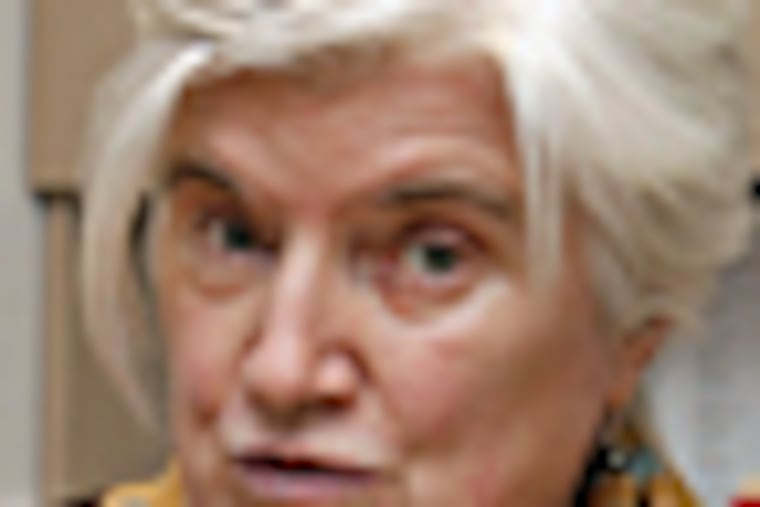A Q&A with Anne O’Callaghan
After heading the Welcoming Center for New Pennsylvanians for almost a decade, Anne O'Callaghan recently handed the reins to a new chief executive officer at the nonprofit immigrant-services organization she created with $90,000 in grants in 2003. Today, its budget is $1.6 million. Over the years it has trained thousands of legal immigrants in English and job skills, and placed 1,100 in jobs.

After heading the Welcoming Center for New Pennsylvanians for almost a decade, Anne O'Callaghan recently handed the reins to a new chief executive officer at the nonprofit immigrant-services organization she created with $90,000 in grants in 2003. Today, its budget is $1.6 million.
Over the years it has trained thousands of legal immigrants in English and job skills, and placed 1,100 in jobs.
O'Callaghan, who turns 70 in June, was 27 when she came to America from Ireland for advanced training as a physical therapist. She married an American and became a U.S. citizen. In 2006, U.S. Citizenship and Immigration Services named her an "Outstanding American by Choice."
A passionate raconteur, she says taxpaying immigrants are a critical work force in a rapidly graying Pennsylvania.
In this edited conversation with staff writer Michael Matza, she spoke about the role of legal immigration in revitalizing the region.
Question:You were 60, with careers in physical therapy and software sales behind you when you got into immigrant services. Why?
O'Callaghan: I was volunteering [in Upper Darby] with immigrants who wanted jobs, and to learn English. I thought, no problem, there must be all kinds of services out there. ... It took me weeks to find anything, and I speak English! ... I thought, this is nuts. [There are services for refugees] but few for ordinary immigrants.
Q: How did you start?
O'Callaghan: I got an interview with [former Pennsylvania House Speaker] John Perzel. He was sympathetic. Then 9/11 happened and [funding] became politically untenable. [A talk-radio host] said Perzel was going to give us $900,000 over two years. That wasn't true at all. But he organized a radio call-in campaign and it became very ugly. ... He said I was bringing in puddle jumpers.
Q: What changed?
O'Callaghan: Kathy Engebretson, [former head] of the William Penn Foundation, was very interested and agreed to a [start-up] grant. ... I needed matching funds. At church I met Wendell Young III [then president of the United Food and Commercial Workers], who sent me to Pat Eiding [president of the Philadelphia Council of the AFL-CIO]. The AFL-CIO had office space on 22d Street between Market and Chestnut Streets, which it donated to the Welcoming Center as an in-kind contribution.
Q: How did you choose the name?
O'Callaghan: I thought, what do we want to do? We want to welcome people. OK, it was that simple.
Q: Who are the immigrants you helped in the beginning, and now?
O'Callaghan: The first were Chinese and Albanians in Upper Darby. We called everyone we knew and said, who speaks Mandarin? Today about 40 percent are Africans [from such countries as] Sierra Leone and Cameroon.
Q: As an immigrant yourself, what do you want Americans to understand?
O'Callaghan: That these economically driven immigrants pay a huge cost. ... As human beings we want to feed our families, educate our children. It's sort of in our DNA. If we are unable to do it where we find ourselves, we look to where we can. ... It's not easy for the immigrant. They are excited. ... There is great love for America. They grow a second heart. But they still have the first one. ... It is exciting but also disturbing to leave behind everything you know.
Q: The center's job-placement service is restricted to legal immigrants. Does the public know that?
O'Callaghan: Some do, some don't. ... A lot of people say, 'Well, my great-grandparents got in line.' No, they didn't. There was no line. Your great-grandparents had the desire to do better for their families for one reason or another and found their way to America. If they passed through Ellis Island, their health was the only issue. If they got through, they were here. That is not the case today.
Q: You believe immigrants should learn English, yet you went to Harrisburg to testify against a bill that would make English the commonwealth's official language for all public business.
O'Callaghan: If America wants to be a beacon of hope and a welcoming place, don't make English the official language. ... If you want to attract people to your state and city, even as visitors, you need to provide [multilingual] information. [At the same time, individually] if you don't learn English you are removing yourself, you are isolating yourself from so much that goes on.
Q: You like measurable outcomes. What's an example of the Welcoming Center's performance?
O'Callaghan: Some newcomers with limited English proficiency are eligible for temporary cash assistance for needy families — TANF. More than 87 percent of people enrolled in our TANF program get jobs within 12 weeks, which means they go off TANF and on to thrive in the workforce. To me, that's a shining statistic.
Contact Michael Matza at 215-854-2541 or mmatza@phillynews.com